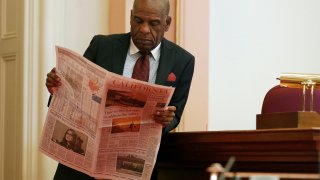
Freelance writers and newspaper carriers would be exempted from a broad new California labor law requiring that many be treated as employees rather than independent contractors, under legislation announced Thursday by a state senator.
The measures face an uphill battle in part because they were introduced by a Republican, Sen. Patricia Bates of Laguna Niguel, in a legislature dominated by Democrats who support the labor law, and because the law’s author opposes at least one of the rollbacks.
However, Democratic Assemblywoman Lorena Gonzalez of San Diego, who heads a powerful gatekeeper committee, has been meeting regularly with those who want changes to her law that took effect Jan. 1. Gov. Gavin Newsom also has said he anticipates tweaks to the law he signed that aim to give wage and benefit protections to people who work as independent contractors.
Gonzalez has introduced legislation that can be updated “to continue our work on these issues and to make sure the law is fair for workers, law-abiding businesses and California’s taxpayers,” she said in a statement.
The focus has been largely on ride-share companies such as Uber and Lyft, but it has already cost freelancers their jobs. Lawmakers gave newspaper companies a one-year delay to figure out how to apply to the law to newspaper carriers, who work as independent contractors. But the California News Publishers Association calls it an “existential threat” to newspapers.
The law sets the nation’s strictest test for which workers must be considered employees and could set a precedent for other states.
“Assembly Bill 5 took a sledgehammer approach to an employment problem that required a scalpel, which consequently hammered many Californians who truly wish to remain their own bosses,” Bates said in a statement. She said her bills would “help preserve quality journalism in many communities.”
Local
Her first measure, SB867, would permanently exempt newspaper distributors and carriers. The second, SB868 would exempt freelance journalists who object to what they say is an arbitrary limit of 35 submissions each year to each media outlet.
Even before the law took effect, SB Nation, owned by Vox Media, announced that it was ending its use of more than 200 California freelancers, switching instead to using a much smaller number of new employees.
The American Society of Journalists and Authors and the National Press Photographers Association sued, saying the law unconstitutionally affects free speech and the media. But a federal judge declined to exempt them until he holds a hearing in March. A different federal judge has blocked the law from affecting more than 70,000 independent truckers, saying it is preempted by federal law when it comes to their profession.
Gonzalez opposed the year-long exemption for newspaper carriers. But Jim Ewert, general counsel for the California News Publishers Association, said his organization hopes to meet with her once newspapers quantify how much it would cost them and if there are any ways to ease the costs.
“It is an existential threat to the industry, without question. But we’re still trying to figure out the right path forward,” he said.



